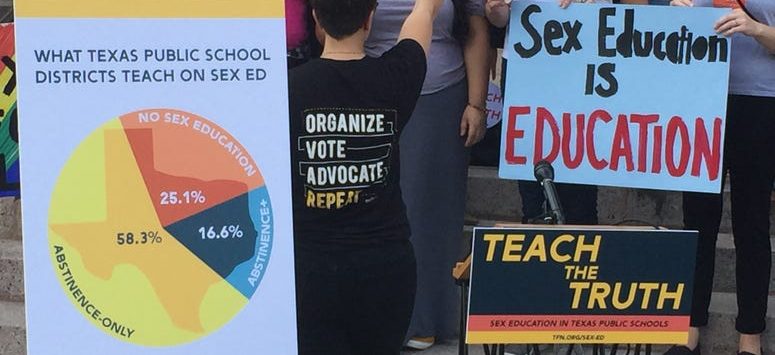Facing the Problem: Grassroots Organizing in Houston
Houston has the unique position of being a very liberal city within a large conservative state. Texas has one of the highest rates in the U.S. of adolescent birthrates and STI transmission rates, as well as the highest rate of repeat teen pregnancies, and Houstonians are outraged. A liberal city in a conservative states functions as the perfect hub for outraged people to find each other and come together to make change. While elsewhere in Texas they might feel isolated in their frustrations with the state’s sex ed policies, cities provide the numbers for powerful organizations to form. Just as in the rest of the nation, community members are driven to organize when they experience any of the many harmful effects of abstinence-only education: unwanted teen pregnancies, misconceptions about gender and sexual identity, misinformation about STIs, stigma surrounding sexual assault, etc. Any of these issues may inspire Houstonians to organize for change, yet change does not come easily. Particularly in a conservative state, there is significant push-back against plans for comprehensive sex education from groups who believe that it exposes children to inappropriate content matter and promotes extramarital sex (despite studies showing that there is no correlation between abstinence-only education and a delayed first sexual experience).
Grassroots Organizing in the U.S.
Many of the grassroots organizations advocating for comprehensive sex ed grow from outrage and personal suffering. Students, parents, and teachers alike see the gaping holes in abstinence-only curriculums (if not outright misinformation) that lead to students leaving school with little more than a basic understanding of reproduction and most likely many misconceptions about sexual health. Community members either themselves felt they were inadequately educated about topics like healthy relationships, consent, and sexual health, or saw others in their community suffer from STIs or unwanted pregnancies. Even in states that include medically accurate sex ed in the curriculum, students with diverse gender or sexual identities feel unrepresented. Community members in both liberal and conservative states demand changes in the sex ed taught in schools.
While some grassroots organizations in favor of comprehensive sex ed fight to change legislation such that lesson plans are inclusive and medically accurate, many instead work to provide the resources that students are not getting through abstinence-only education. Organizations often are comprised of community volunteers as well as educators who offer a variety of services such as sexual health seminars, LGBTQ healthcare/support, and providing free contraception and STI testing. While organizations may take any number of approaches to counter-act the lack of comprehensive sex-ed, they have made immeasurable progress in getting legislation changed and providing support to students and their families.
